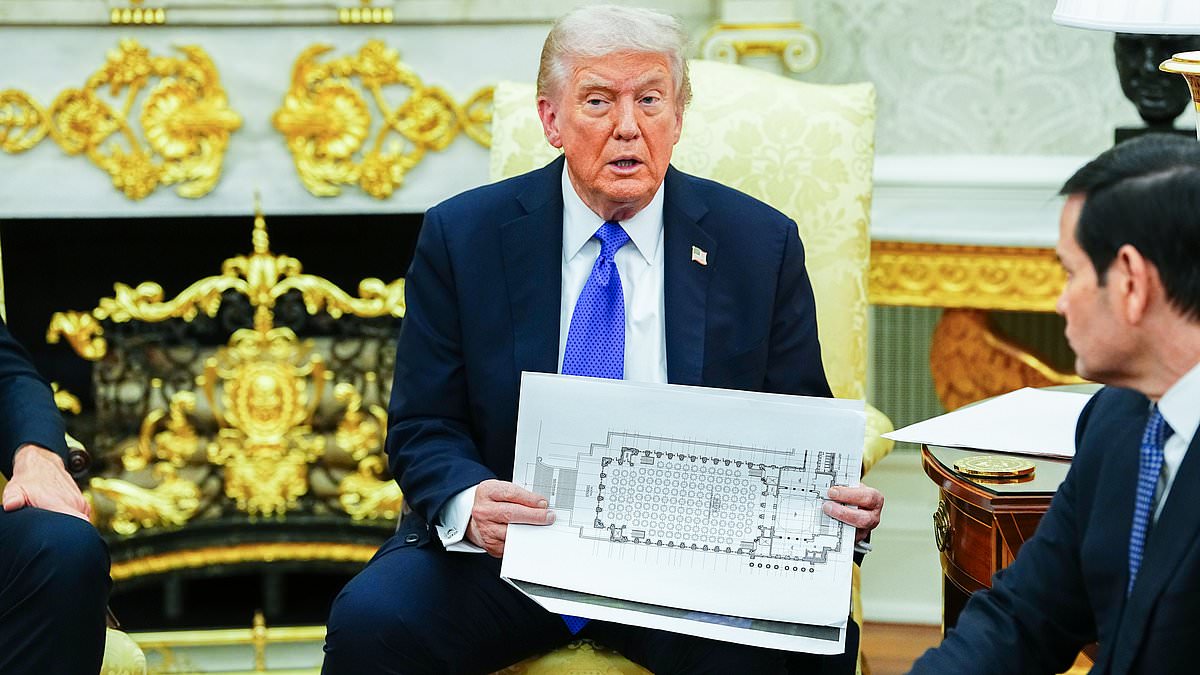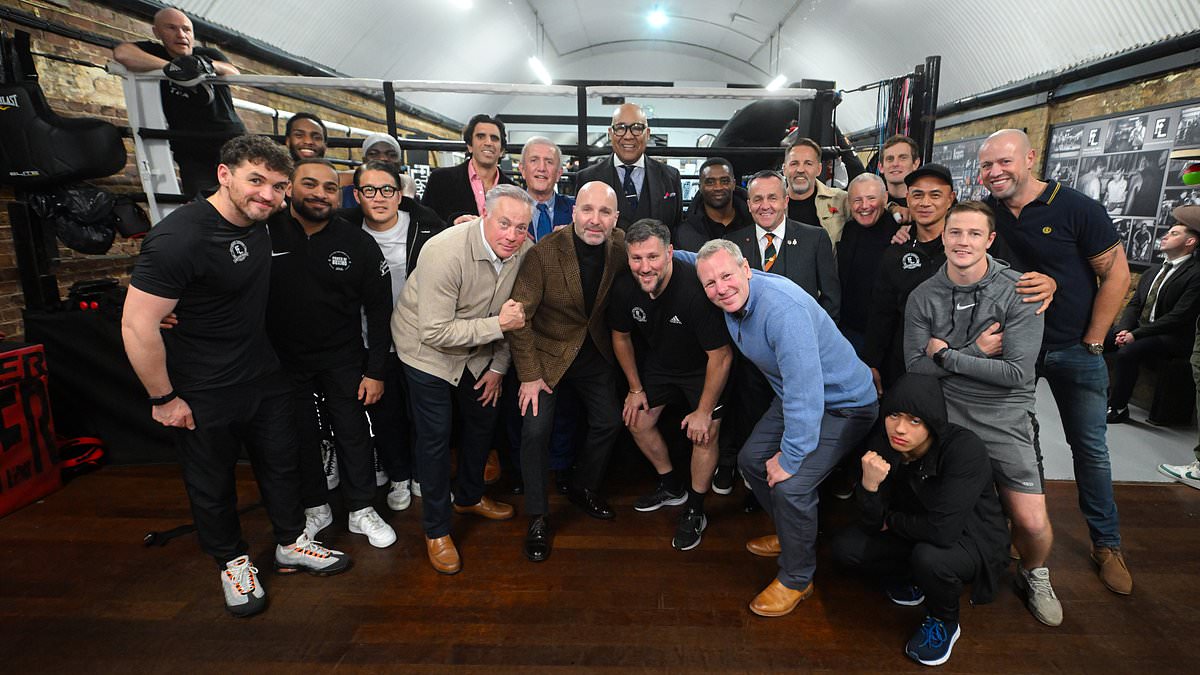Copyright dailymail

The construction company hired to build Donald Trump's lavish new White House ballroom has a history of massive cost overruns and years-long delays on some of its most high-profile projects, the Daily Mail can reveal. Clark Construction, a Virginia-based firm, was handpicked to build the President's $300million, 90,000 sq ft 'Trump Ballroom' – which is being funded entirely by private donors. But the company's controversial track record of setbacks and budget overruns of hundreds of millions of dollars is now raising fresh questions about whether Trump's latest vanity project will face the same kind of delays or force donors to cough up even more cash. Clark is led by Robert Moser, who started at the company in 1997 as field engineer before working his way up to being President in 2013. In a letter to Moser sent this week, Sen. Richard Blumenthal, the Connecticut Democratic who is the ranking member on the Subcommittee on Investigations, asked him to explain how Clark obtained the White House contract and if the firm had ever worked with Trump in the past. Blumenthal said that Clark currently holds $4billion in federal government contracts, meaning that it has 'much to gain from being in President Trump's good graces'. While the company champions other projects on its website, there is no mention of its contract for the ballroom. Among Clark's recent botched ventures is the development of the most expensive military hospital project in the nation which was completed four years late. The William Beaumont Army Medical Center in El Paso, Texas, finally opened in 2021 at a cost of $1.4billion, more than $629million over its original cost. In Washington, D.C., Clark was also general contractor on the Silver Line Metro extension, which also ran four years behind schedule and hundreds of millions over its original estimate after a series of concrete defects and management disputes. Over on the west coast, the company's role overseeing Seattle-Tacoma Airport's (Sea-Tac) new international terminal cost nearly three times the original budget and wasn't even big enough for the number of aircraft it was designed to handle –resulting in a bitter legal war. Clark is a major player in the construction industry. Based in McLean, Virginia, it employs nearly 5,000 people and has annual revenues of $7billion. Its public sector jobs were subject to more scrutiny given that it was using public money, and while the White House ballroom is being bankrolled by private donors, it is already attracting a high level of attention. The price of the 900-seat ballroom has already increased from $200million to $300million and Trump controversially tore down the East Wing of the White House to make room for it. Donors include crypto billionaires, major Trump donors and tech companies like Microsoft. Trump has not explained how the contracts for the project were awarded, but there is little sign they went through the normal federal bidding process. Noah Bookbinder, president of watchdog nonprofit CREW, told Daily Mail that the deal appeared to be a 'no-bid contract.' 'One of the reasons you have a bidding process is to evaluate the companies that could do the work and see how their pricing and past work compares,' Bookbinder said. 'Once you take out that process, there's more possibility of not getting the best value and the best work. We don't see much sign there was a process to ensure that.' Clark has a major presence in the capital and previous projects include famous landmarks including more than a dozen Smithsonian projects such as the National Museum of African American History & Culture. Other major projects in the Washington area include the Capital One Arena, Nationals Park, and Amazon HQ2 in Pentagon City, Virginia. But Clark has also been involved in some fraught efforts, notably those in the public sector, which includes the William Beaumont Army Medical Center, near Fort Bliss, Texas. The original budget was $740million and Clark won the contract as part of a joint venture with McCarthy Building Companies of St. Louis, Missouri, called Clark McCarthy. It was due to be a 1.1 million square foot complex, or the size of 17 football fields, and would include a 135 bed hospital to cater for the rapidly expanding Fort Bliss. Construction began in 2013 but problems began soon after when the subcontractor laying the foundations went bankrupt and a welder was killed on the job in 2015. Midwest Steel, a Detroit-based company that erected steel columns for the project, said in a lawsuit that the medical center was 'extraordinarily troubled from the start'. The claims in the lawsuit – which Clark McCarthy rejected – said: 'There were major defects in the design, which impacted the schedule and greatly increased costs and time on the project'. The case was eventually dismissed after both sides agreed to drop it. An audit released in June 2018 by the US Department of Defense Inspector General also claimed there were serious design errors. By that point there had been a staggering 978 contract change requests resulting in $178million in losses, the audit said. The medical center finally opened in 2021 at a cost of more than $1.4billion but the problems did not end there. In 2022, just nine months after it opened, the hospital went without drinkable water for weeks after staff noticed debris coming out of the taps. The repairs cost $1.1million. Among those who have criticized the delays is Rep Veronica Escobar, a Democrat who represents El Paso. She has said that it was 'shocking' and 'mind boggling' how over budget and delayed the project was. A similar catalog of problems unfolded during the second phase of the Silver Line extension on the Washington Metro, another project Clark took the lead on. The Metropolitan Washington Airports Authority commissioned the 11.4-mile, $3billion project in 2013 to link Wiehle-Reston with Ashburn, including a stop at Dulles International Airport in Virginia. Clark's bid, in partnership with Kiewit Infrastructure South, was for the second phase and came in at $1.1 billion. Construction started in 2015. Problems with the concrete soon began to plague construction and in July 2015 cracks were found in the girders supporting the station at Dulles Airport. A Washington Post investigation found that more than 400 concrete tiles had problems which caused trains to tilt outwards, and a whistleblower claimed that the manufacturer had falsified inspection reports. A 2020 report by the Metro inspector general criticized the 'ineffectiveness and inconsistency' of quality control management and cited the lack of coordination among subcontractors. In the end, the project was finished in 2022, four years late, and had to use money from taxpayers in Fairfax and Loudoun counties, as well as toll road revenue, to pay for it. Clark's reputation also suffered after the fiasco over the international arrivals terminal at Sea-Tac, which was supposed to be completed by 2018 for $344million. Instead it finally opened in 2022 costing $986million, or nearly three times that figure, with the money coming from airport revenue and air ticket fees. Some $86million of the overruns were attributed to Clark underestimating its design costs and failing to design to the budget, according to the Port of Seattle, which runs the airport. But even before the terminal opened, another more serious problem became apparent: it wasn't big enough. The Port of Seattle claimed that the airport was supposed to accommodate 20 large aircraft, also known as wide-body planes. The new terminal could only hold 16 and the Port of Seattle said it would lead to 'tens of hundreds of millions of dollars' in lost revenue. The botched construction left Sea-Tac 'with an international-flight capacity problem that this project was originally intended to solve', the airport claimed. The Port of Seattle and Clark filed dueling lawsuits in 2022 and 2023: The Port demanded $100million for fixing the flawed design while Clark demanded $60million for unpaid labor and pandemic building costs. The parties reached a settlement in January whereby Clark paid $28million to the Port of Seattle, which agreed to pay Clark $13.7million. Clark's decision to take the White House ballroom project on despite the negative attention could be a calculation to get more government business, Bookbinder said. 'This is clearly a project that is tremendously valued by the President. Just as companies that are giving money to this project appear to be looking to get favorable treatment from him, presumably the company doing the work would likely be thinking that could make a positive impression and get more directed their way in the future. It certainly creates that appearance.' Clark's history with the Trump administration dates back to his first term in the White House when it won the contract in 2017 to build a new Eisenhower memorial in Washington. Critics raised eyebrows at the cost and the Frank Gehry design ended up costing $150million. Trump's relationship with Clark continued after he won his second term and in August the President said that he was giving out a $2billion contract to the company for the beautification of Washington. Trump said: 'We're going to wisely spend the money we're doing with Clark construction. 'We're going to head out right from the Capitol and the White House and look at a circle and go about three miles out. 'It's going to be beautiful. All those light poles. Or you can see the poles, they're rusting and they've got different lenses on top if you look, I mean, just looking at so many different problems and we're going to have this place beautified within a period of 12 months'. The Trump administration has not yet made a formal request for the money, which would have to be approved by Congress. Neither Clark nor the White House returned requests for comment.



